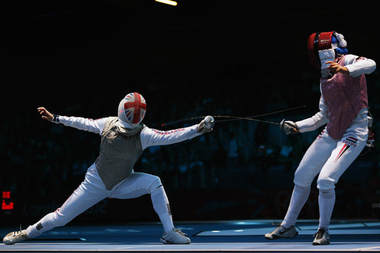|
By Anna Bentley-Ward, British Olympic fencer. I completed my first Parkrun (a free, weekly, timed 5k run) in 2015, a year after I gave birth to my first baby. It turns out Olympians aren’t immune to experiencing the challenges of new motherhood so my local, hilly Parkrun quickly became an important mental and physical escape from the relentlessness of being a new mum. Running therefore had one important purpose – to make me feel like myself again. Recently, I have become involved with The True Athlete Project (TAP), an organisation which promotes a more compassionate society through the power of sport. As a mentor, I draw on my experiences as a former World Class athlete to help aspiring sports people improve their athletic performance, support their well-being and encourage them to use the power of sport to give back to their community. I felt strongly that I too wanted to make a positive contribution in my neighbourhood, so I volunteered to become a Parkrun Guide Runner. At my local Parkrun, there is a small group of Visually Impaired (V.I) runners, one of whom I used to keep pace with when he was fully sighted. Their stories of adversity and how they continue to overcome that adversity every day is truly inspiring. My guide running debut was with Malachy, a local runner who despite only being able to see shadow and some contrast has managed to complete an incredible 116 Parkruns (and counting). As a former athlete I am accustomed to preparing very meticulously before performances so I was a little surprised to learn that there was no formal training offered before my first guide run! Walking to the start line on that first Saturday with Malachy, I felt an incredible sense of pressure and responsibility to guide him safely round the course. I was pretty nervous about him tripping, crashing or falling, so I directed our conversation to agreeing the phrases I would use to count down the corners and how to (sometimes not so politely) tell other runners to move out of our way (turns out this isn’t so easy when someone is wearing headphones!). Malachy also told me that he wanted to start at the very front so that the fast runners passed us quickly and we stayed ahead of the mass. It was quite daunting to be standing next to the sub 20 minute runners when the gun went off, but he was absolutely right – it is the safest place for him to be when surrounded by 180 other Parkrunners. Guides and V.I runners share a wrist band and stick very close together at the start of the run. The first kilometer is the most challenging. Jostling runners all trying to get ahead along a narrow path filled with park benches, litter bins and other park users, including dogs. Most regular runners are aware there are guided runners on the course but that doesn’t guarantee a stress-free start. Whilst guiding Ian, another regular V.I runner at Gladstone, a man came up our inside just as we were making a turn and crashed into us. Luckily everyone stayed on their feet but it was a heart stopping moment. On that first run I was surprised to find old familiar emotions resurface from my competitive days as an athlete. I felt nervous because my performance was vital to the success of the team; under pressure to process real time information, filter it and then communicate the vital bits clearly – all whilst running at target pace. I was also worried about Malachy’s safety! This cocktail of emotions was just like being my former athlete self again. It was so familiar to me that I knew how to deal with it, which helped me relax and get us both confidently into our strides. In the 6 weeks since I first became a guide runner, I have now completed 3 runs with both Malachy and Ian. During the week, Malachy and I like to set our run strategy and kilometre goals for the coming Saturday. I love how it gives my week a focus, something exciting but challenging to try and achieve together. Despite only running a very few times so far, it does feel like we’ve run together for far longer. There’s something about that unspoken communication, when two people are in tune with each other and can tell how the other is feeling without needing to put it into words. For some reason Malachy and I seem to have found that. It is great to be able to push together to achieve his personal goals, but most of all I’m delighted to have found this way of giving back to the local community and to have discovered yet another way in which sport can empower and improve people’s lives.  Anna Bentley competed for Great Britain at the London Olympics and at the World and European Championships from 2007 to 2012. She is a Commonwealth silver-medalist, a three-time British national champion, and an experienced mentor - with the Dame Kelly Holmes Trust, Youth Sports Trust, and most recently with The True Athlete Project. Her mentee is promising Sussex cricketer, Bethan Harvey.
6 Comments
|
AuthorInsightful contributions by our expert team and guest contributors! Archives
July 2020
Categories |
|
The True Athlete Project is formed of two independent legal entities: The True Athlete Project (US), which is a 501(c)(3) nonprofit organisation under US federal tax guidelines, and The True Athlete Project Ltd (UK), which is a UK charity, registration number: 1198569.
The UK entity and the US entity serve to strengthen one another but have distinct strategies and are independent of one another. The True Athlete Project (US): Tax ID: 81-1063080 The True Athlete Project Ltd. Companies House No: 12416150 © Copyright 2024. The True Athlete Project. All rights reserved. |

 RSS Feed
RSS Feed